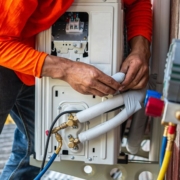How to Tell If AC Compressor Is Bad
The air conditioning (AC) compressor is a critical component of any cooling system. It pressurizes and circulates the refrigerant through the AC system, allowing heat to be removed from indoor air. A malfunctioning compressor can reduce cooling efficiency or stop the system from working entirely. Identifying signs of a bad AC compressor early can prevent further damage and expensive repairs.
Signs of a Bad AC Compressor
One of the primary indicators of a failing AC compressor is reduced cooling performance. If the air coming from the vents is warmer than usual, or if the system takes longer than normal to cool a room, the compressor may be losing its ability to circulate refrigerant effectively.
Strange noises are another common sign. A failing compressor can produce loud or unusual sounds, such as rattling, grinding, or squealing. These noises often indicate internal mechanical problems, such as worn bearings or damaged components within the compressor.
Another indicator is a system that fails to turn on. A bad compressor may prevent the AC from starting even when the thermostat is set correctly. Electrical issues such as blown fuses or tripped breakers can also point to a failing compressor.
Visible signs of damage, including refrigerant leaks around the compressor unit, can suggest a problem. Refrigerant leaks reduce pressure in the system, leading to inefficient cooling and potential ice formation on the evaporator coil. Over time, low refrigerant levels can cause additional strain on the compressor, accelerating failure.
The AC system may also cycle on and off more frequently than usual. Short cycling occurs when the compressor overheats or struggles to maintain proper pressure. This behavior not only reduces comfort but can also cause long-term damage to the system.
High electrical consumption is another sign. A failing compressor may draw excessive amps, increasing electricity usage. Monitoring the AC’s electrical consumption or noticing a sudden rise in energy bills can indicate a problem with the compressor.
Causes of AC Compressor Failure
AC compressors can fail due to several reasons. Electrical issues, such as faulty wiring or damaged capacitors, can prevent the compressor from operating correctly. Mechanical wear over time is another factor, as internal components degrade after years of operation.
Low refrigerant levels or leaks are common contributors to compressor failure. Without proper refrigerant flow, the compressor must work harder to maintain cooling, increasing the risk of overheating. Lack of maintenance, including infrequent inspections and dirty coils, can accelerate wear and tear, leading to premature failure.
How to Test the AC Compressor
Testing a compressor requires measuring electrical continuity and system pressure. Using a multimeter, check for continuity across the compressor’s terminals. A lack of continuity may indicate an internal electrical fault. Checking system pressures with gauges can reveal whether the compressor is building the correct pressure in the high and low sides of the AC system.
Listening for proper operation is also helpful. When the AC turns on, the compressor should start with minimal noise and run steadily. Irregular sounds or failure to engage often point to mechanical or electrical problems.
FAQ
Can I drive with a bad AC compressor?
Yes, the vehicle can still operate, but the AC will not cool effectively. Prolonged operation of a failing compressor can lead to further system damage.
How long does an AC compressor last?
Typically, a compressor lasts 8 to 12 years depending on usage, maintenance, and operating conditions.
Is a blown fuse a sign of a bad compressor?
A blown fuse can indicate electrical issues, which may include a failing compressor or related components such as the capacitor or relay.
Can low refrigerant damage the compressor?
Yes. Low refrigerant causes the compressor to overwork and overheat, leading to potential mechanical failure.
Do all AC problems mean the compressor is bad?
No. Issues like clogged filters, thermostat malfunctions, or refrigerant leaks can mimic compressor problems. Proper diagnosis is essential.
Conclusion
A failing AC compressor can manifest through reduced cooling, unusual noises, system failure to start, refrigerant leaks, short cycling, and increased electrical consumption. Causes include mechanical wear, electrical problems, low refrigerant, and poor maintenance. Testing the compressor with a multimeter and pressure gauges can help identify faults. Detecting issues early and addressing them promptly prevents further damage and maintains effective cooling. Regular system inspections and timely maintenance are key to prolonging the lifespan of the AC compressor and ensuring reliable performance.

